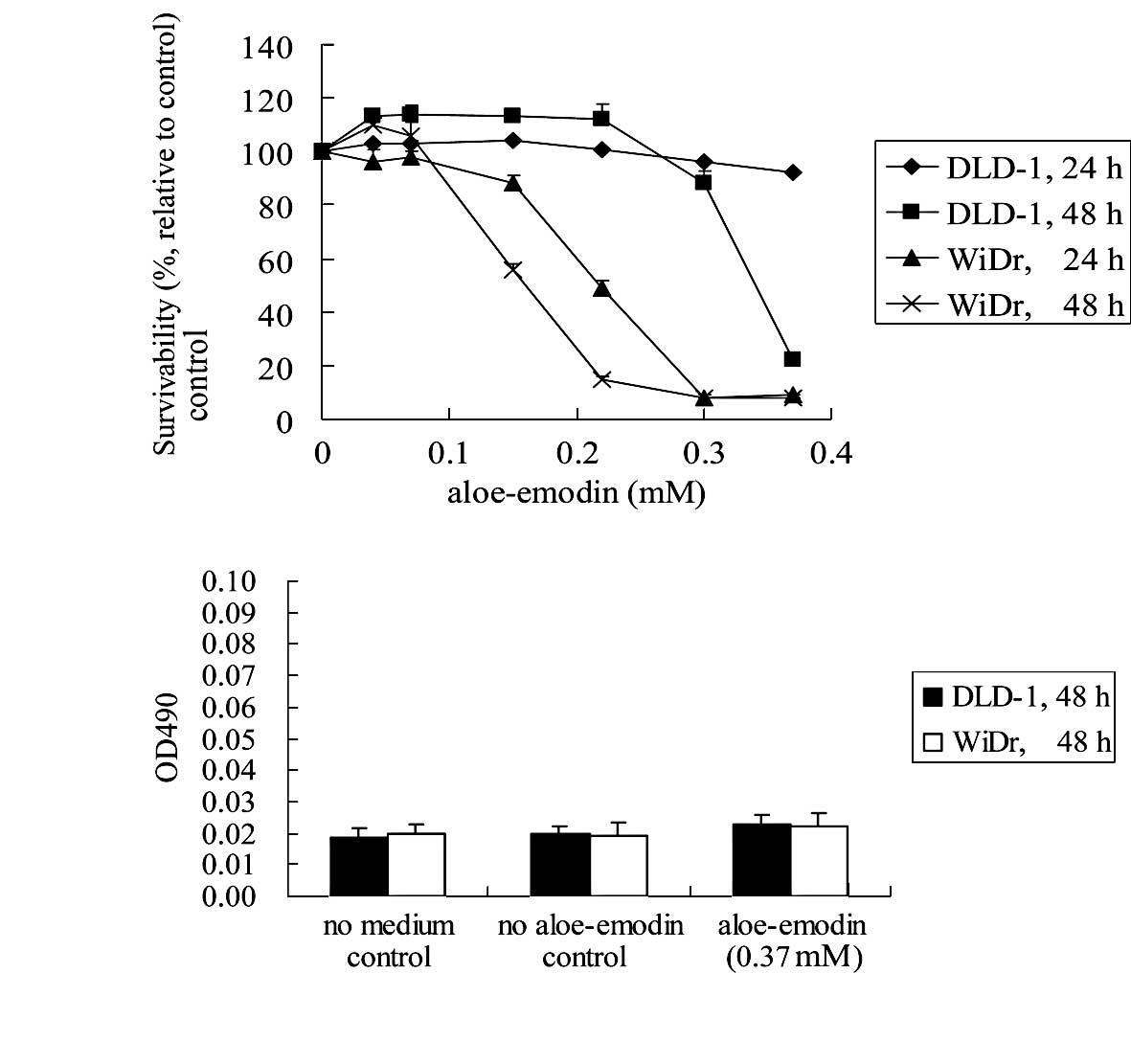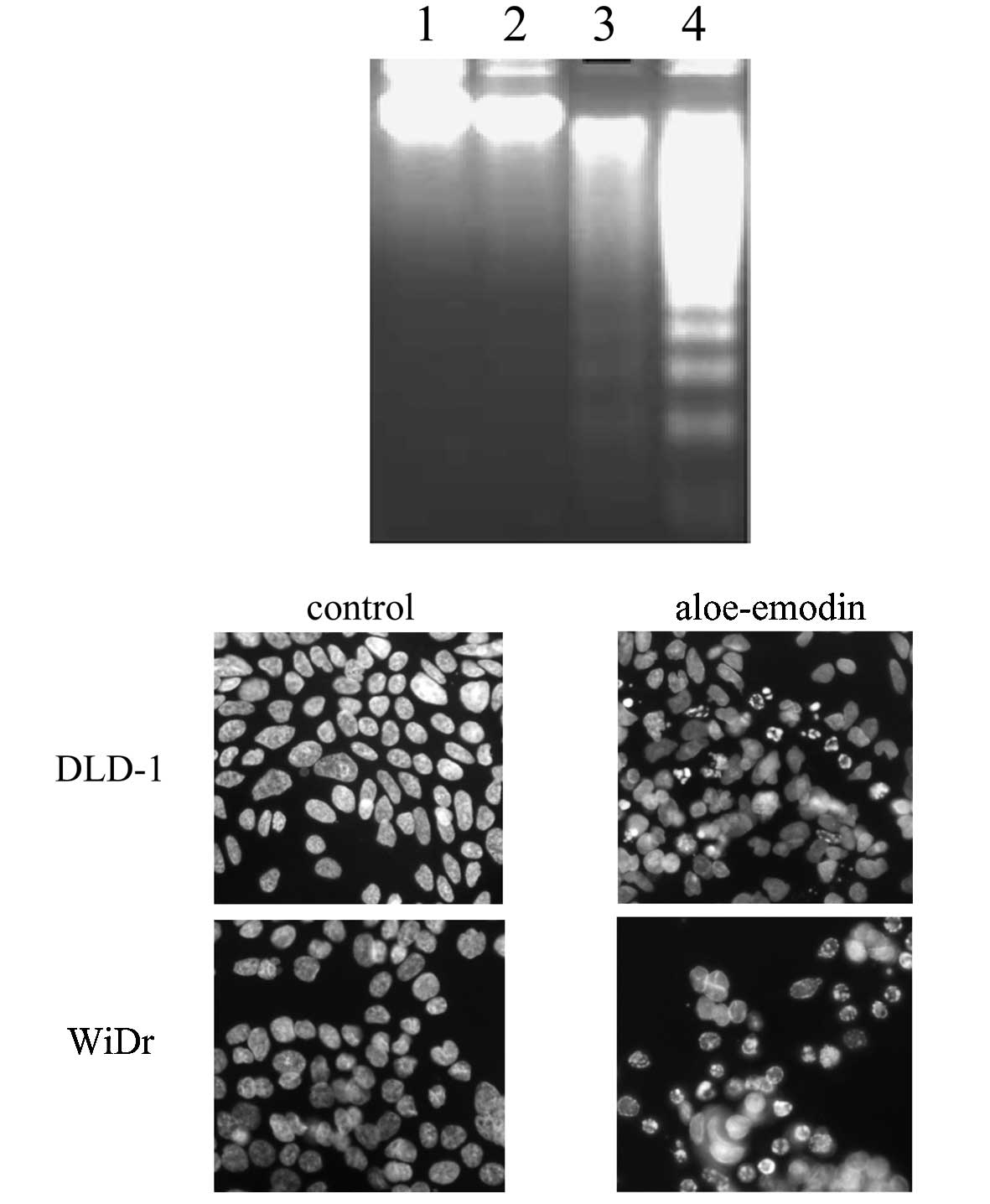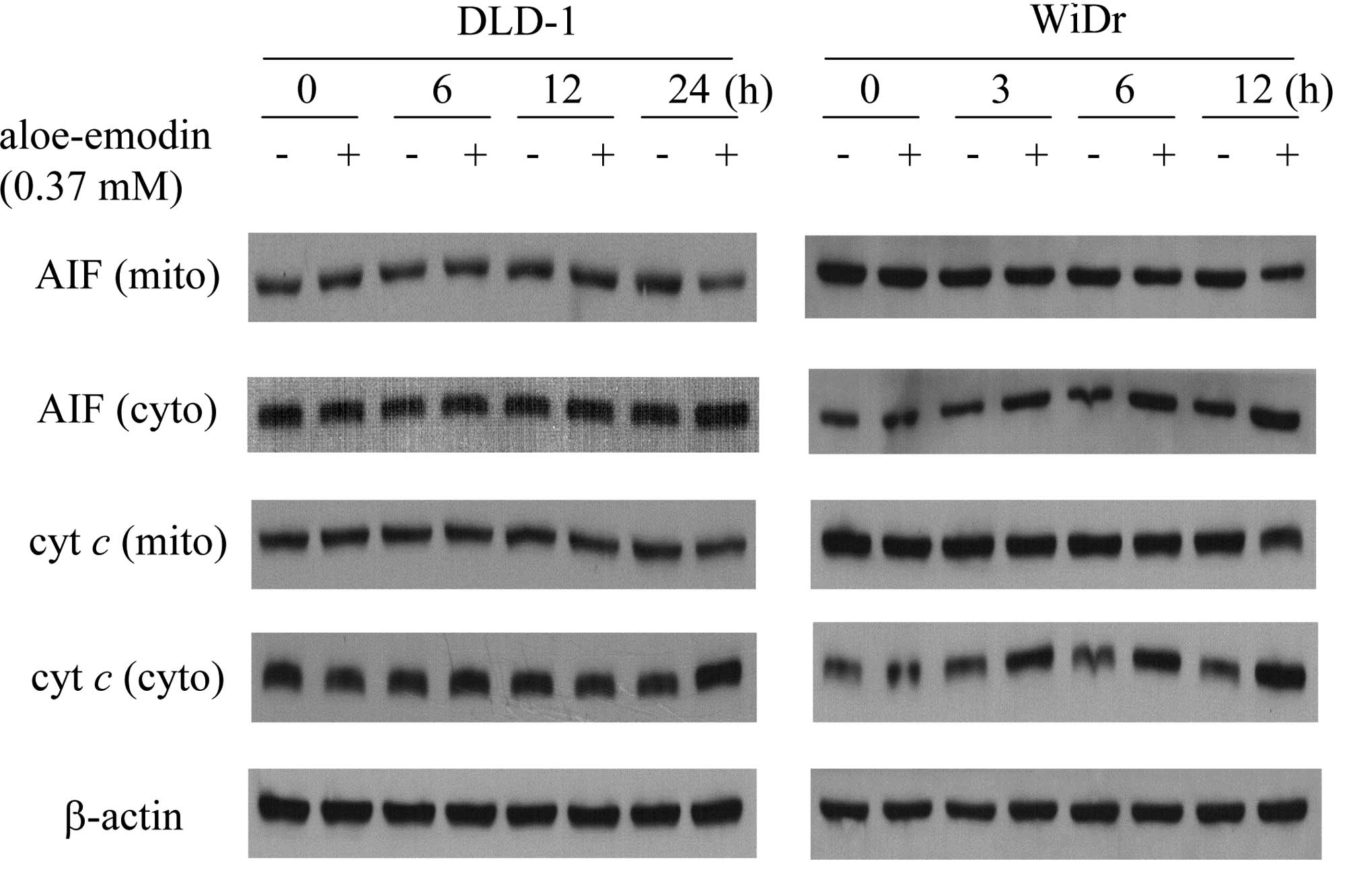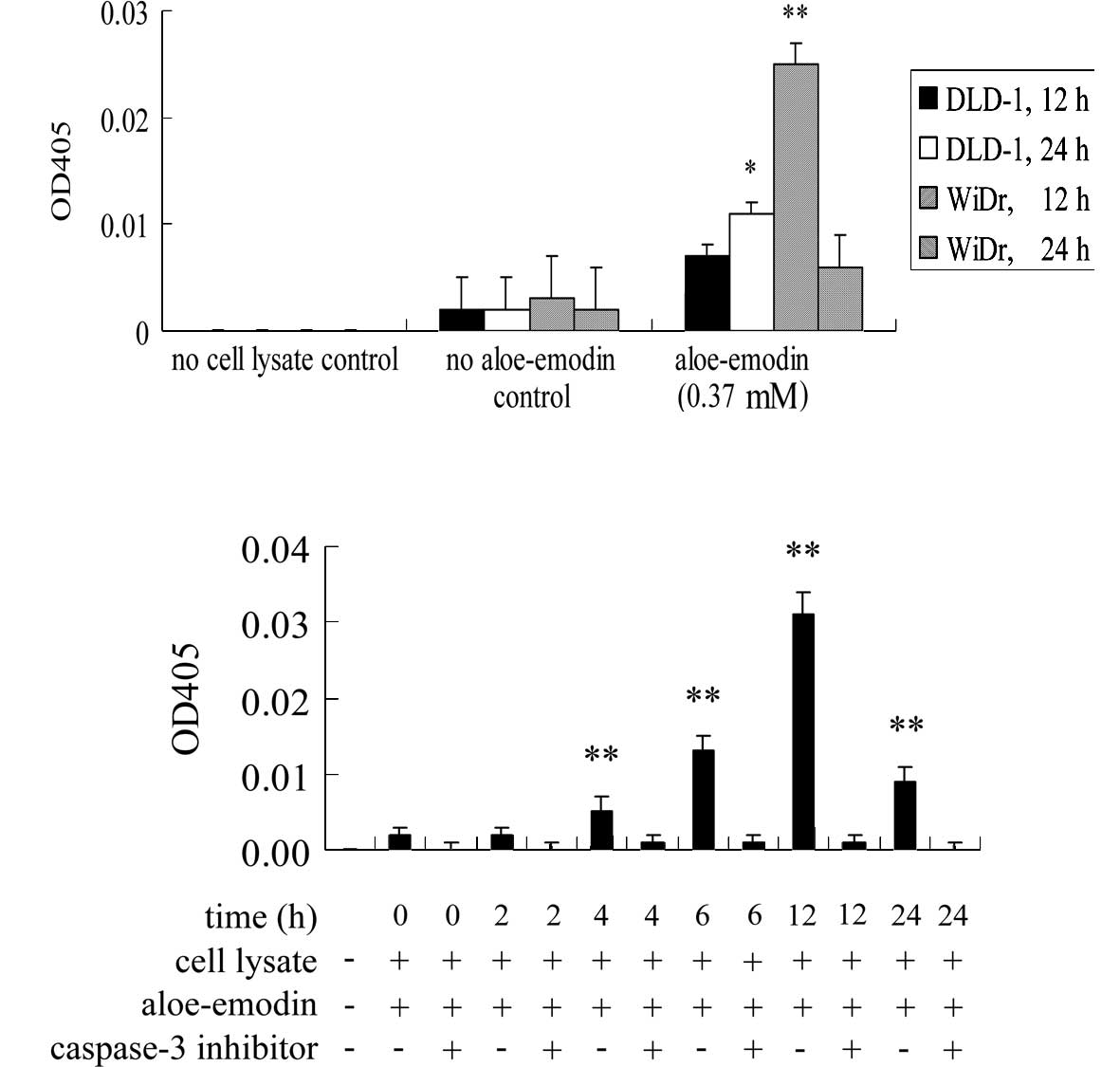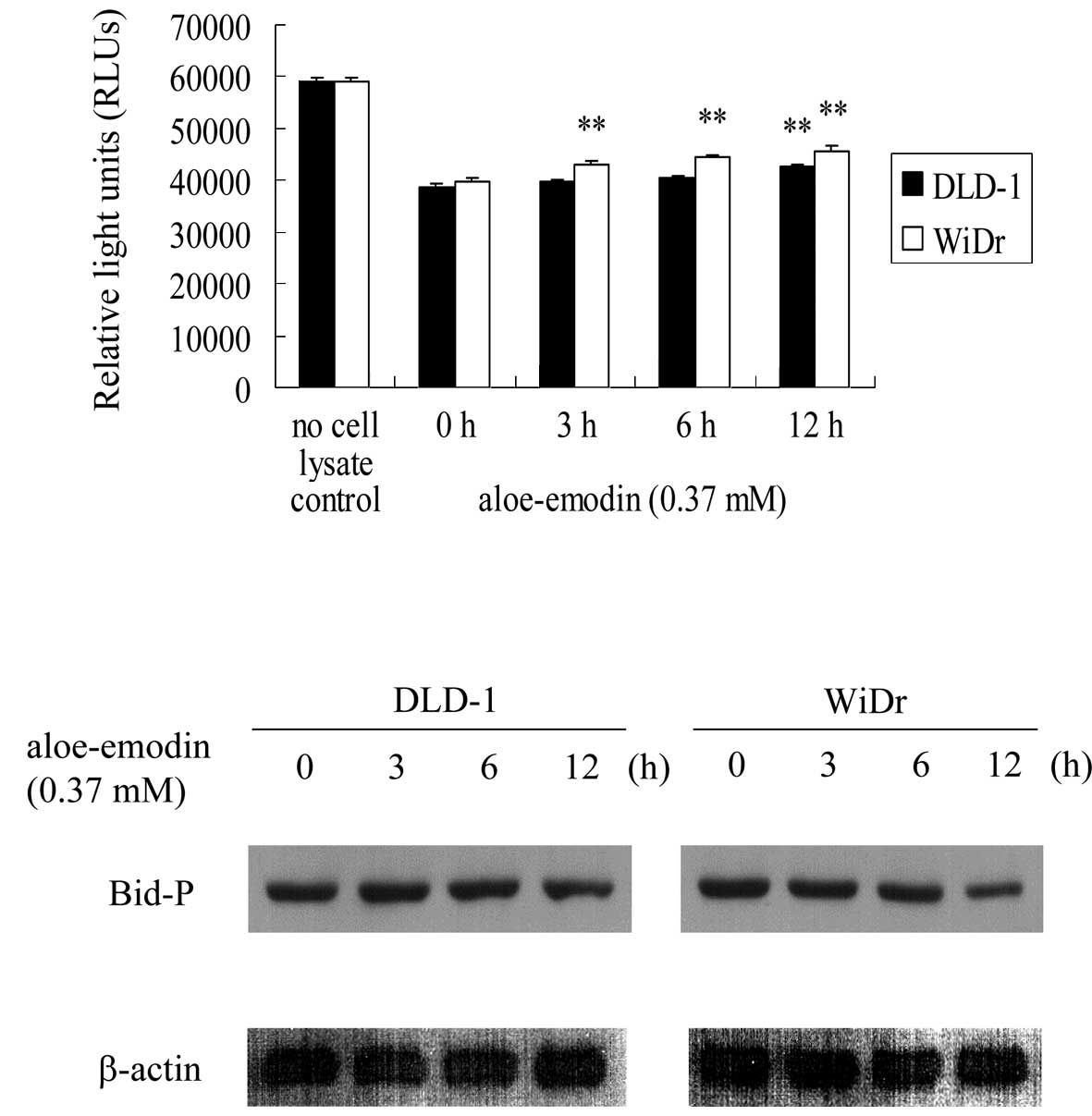|
1
|
Reynolds T: The compounds in Aloe leaf
exudates: a review. Bot J Linn Soc. 90:157–177. 1985. View Article : Google Scholar
|
|
2
|
Eshun K and He Q: Aloe vera: a valuable
ingredient for the food, pharmaceutical and cosmetic industries – a
review. Crit Rev Food Sci Nutr. 44:91–96. 2004.PubMed/NCBI
|
|
3
|
Pecere T, Gazzola MV, Mucignat C, Parolin
C, Vecchia FD, Cavaggioni A, Basso G, Diaspro A, Salvato B, Carli M
and Palu G: Aloe-emodin is a new type of anticancer agent with
selective activity against neuroectodermal tumors. Cancer Res.
60:2800–2804. 2000.PubMed/NCBI
|
|
4
|
Lee HZ, Hsu SL, Liu MC and Wu CH: Effects
and mechanisms of aloe-emodin on cell death in human lung squamous
cell carcinoma. Eur J Pharmacol. 431:287–295. 2001. View Article : Google Scholar : PubMed/NCBI
|
|
5
|
Kuo PL, Lin TC and Lin CC: The
antiproliferative activity of aloe-emodin is through p53-dependent
and p21-dependent apoptotic pathway in human hepatoma cell lines.
Life Sci. 71:1879–1892. 2002. View Article : Google Scholar : PubMed/NCBI
|
|
6
|
MAcevedo-Duncan M, Russell C, Patel S and
Patel R: Aloe-emodin modulates PKC isoenzymes, inhibits
proliferation and induces apoptosis in U-373MG glioma cells. Int
Immunopharmacol. 4:1775–1784. 2004. View Article : Google Scholar : PubMed/NCBI
|
|
7
|
Yi J, Yang J, He R, Gao F, Sang H, Tang X
and Ye RD: Emodin enhances arsenic trioxide-induced apoptosis via
generation of reactive oxygen species and inhibition of survival
signaling. Cancer Res. 64:108–116. 2004. View Article : Google Scholar : PubMed/NCBI
|
|
8
|
Mijatovic S, Maksimovic-Ivanic D, Radovic
J, Miljkovic D, Kaludjerovic GN, Sabo TJ and Trajkovic V: Aloe
emodin decreases the ERK-dependent anticancer activity of
cisplatin. Cell Mol Life Sci. 62:1275–1282. 2005. View Article : Google Scholar : PubMed/NCBI
|
|
9
|
Penninger JM and Kroemer G: Mitochondria,
AIF and caspases – rivaling for cell death execution. Nat Cell
Biol. 5:97–99. 2003.
|
|
10
|
Kim R, Emi M and Tanabe K: Role of
mitochondria as the gardens of cell death. Cancer Chemother
Pharmacol. 57:545–553. 2006. View Article : Google Scholar : PubMed/NCBI
|
|
11
|
Susin SA, Lorenzo HK, ZamZami N, et al:
Molecular characterization of mitochondrial apoptosis-inducing
factor. Nature. 397:441–446. 1999. View
Article : Google Scholar : PubMed/NCBI
|
|
12
|
Kikkawa U, Mann SK, Firtel RA and Hunter
T: Molecular cloning of casein kinase II alpha subunit from
Dictyostelium discoideum and its expression in the life
cycle. Mol Cell Biol. 12:5711–5723. 1992.PubMed/NCBI
|
|
13
|
Ahmad KA, Wang G, Slaton J, Unger G and
Agmed K: Targeting CK2 for cancer therapy. Anti-Cancer Drugs.
16:1037–1043. 2005. View Article : Google Scholar : PubMed/NCBI
|
|
14
|
Ahmed K, Gerber DA and Cochet C: Joining
the cell survival squad: an emerging role for protein kinase CK2.
Trends Cell Biol. 12:226–230. 2002. View Article : Google Scholar : PubMed/NCBI
|
|
15
|
Desagher S, Osen-Sand A, Montessuit A,
Magnenat E, Vibois F, Hochmann A, Journot L, Antonsson B and
Martinou JC: Phosphorylation of bid by casein kinases I and II
regulates its cleavage by caspase 8. Mol Cell. 8:601–611. 2001.
View Article : Google Scholar : PubMed/NCBI
|
|
16
|
Unger GM, Davis AT, Slaton JW and Ahmed K:
Protein kinase CK2 as regulator of cell survival: implications for
cancer therapy. Curr Cancer Drug Targets. 4:77–84. 2004. View Article : Google Scholar : PubMed/NCBI
|
|
17
|
Lin KY, Wang HH, Lai ST, Pan JP and Chiang
AN: β2-glycoprotein I protects J774A.1 macrophages and
human coronary artery smooth muscle cells against apoptosis. J Cell
Biochem. 94:485–496. 2005.
|
|
18
|
Chatterjee PK, Todorovic Z, Sivarajah A,
Mota-Filipe H, Brown PAJ, Stewart KN, Cuzzocrea S and Thiemermann
C: Differential effects of caspase inhibitors on the renal
dysfunction and injury caused by ischemia-reperfusion of the rat
kidney. Eur J Pharmacol. 503:173–183. 2004. View Article : Google Scholar : PubMed/NCBI
|
|
19
|
Martin RM, Leonhardt H and Cardoso MC: DNA
labeling in living cells. Cytometry Part A. 67A:45–52. 2005.
View Article : Google Scholar
|
|
20
|
Sharma S, Dube A and Bose B:
Pharmacokinetics and phototoxicity of purpurin-18 in human colon
carcinoma cells using liposomes as delivery vehicles. Cancer
Chemother Pharmacol. 57:500–506. 2006. View Article : Google Scholar : PubMed/NCBI
|
|
21
|
Lee HZ: Protein kinase C involvement in
aloe-emodin- and emodin-induced apoptosis in lung carcinoma cell.
Br J Pharmacol. 134:1093–1103. 2001. View Article : Google Scholar : PubMed/NCBI
|
|
22
|
Sarno S, Moro S, Meggio F, Zagotto G, Ben
DD, Ghisellini P, Battistutta R, Zanotti G and Pinna LA: Toward the
rational design of protein kinase casein kinase-2 inhibitors.
Pharmacol Ther. 93:159–168. 2002. View Article : Google Scholar : PubMed/NCBI
|
|
23
|
Litchfield DW: Protein kinase CK2:
structure, regulation and role in cellular decisions of life and
death. Biochem J. 369:1–15. 2003. View Article : Google Scholar : PubMed/NCBI
|
|
24
|
Chau DHW, Yuan J, Zhang H, Cheung P, Lim
T, Liu Z, Sall A and Yang D: Coxsackievirus B3 proteases 2A and 3C
induce apoptotic cell death through mitochondria injury and
cleavage of eIL4GI but not DAP5/p97/NAT1. Apoptosis. 12:513–524.
2007. View Article : Google Scholar : PubMed/NCBI
|
|
25
|
Shulga N and Pastorino JG: Acyl coenzyme
A-binding protein augments Bid-induced mitochondrial damage and
cell death by activating μ-calpain. J Biol Chem. 281:30824–30833.
2006.PubMed/NCBI
|
|
26
|
Garrido C, Galluzzi L, Brunet M, Puig PE,
Didelot C and Kroemer G: Mechanisms of cytochrome c release from
mitochondria. Cell Death Differ. 13:1423–1433. 2006. View Article : Google Scholar : PubMed/NCBI
|
|
27
|
Kwon KB, Kim EK, Han MJ, et al: Induction
of apoptosis by Radix Paeoniae Alba extract through
cytochrome c release and the activations of caspase-9 and caspase-3
in HL-60 cells. Biol Pharm Bull. 29:1082–1086. 2006.
|
|
28
|
Zhang XM, Chen J, Xia YG and Xu Q:
Apoptosis of murine melanoma B16-BL6 cells induced by quercetin
targeting mitochondria, inhibiting expression of PKC-α and
translocating PKC-δ. Cancer Chemother Pharmacol. 55:251–262.
2005.PubMed/NCBI
|
|
29
|
Ahmad KA, Wang G and Ahmed K:
Intracellular hydrogen peroxide production is an upstream event in
apoptosis induced by down-regulation of casein kinase 2 in prostate
cancer cells. Mol Cancer Res. 4:331–338. 2006. View Article : Google Scholar : PubMed/NCBI
|
|
30
|
Morris RJ, Fischer SM, Klein-Szanto AJ and
Slaga TJ: Subpopulations of primary adult murine epidermal basal
cells sedimented on density gradients. Cell Tissue Kinet.
23:587–602. 1990.PubMed/NCBI
|
|
31
|
Tiberio R, Marconi A, Fila C, et al:
Keratinocytes enriched for stem cells are protected from anoikis
via an integrin signaling pathway in a Bcl-2 dependent manner. FEBS
Lett. 524:139–144. 2002. View Article : Google Scholar : PubMed/NCBI
|
|
32
|
Teplova V, Jaaskelainen E,
Salkinoja-Salonen M, Saris NE, Serlachius M, Li FY and Andersson
LC: Differentiated Paju cells have increased resistance to toxic
effects of potassium ionophores. Acta Biochim Pol. 51:539–544.
2004.PubMed/NCBI
|
|
33
|
Zuliani T, Denis V, Nobless E, Schnebert
S, Andre P, Dumas M and Ratinaud MH: Hydrogen peroxide-induced cell
death in normal human keratinocytes is differentiation dependent.
Free Radic Biol Med. 38:307–316. 2005. View Article : Google Scholar : PubMed/NCBI
|
|
34
|
Jansen BJ, van Ruissen F, Cerneus S, Cloin
W, Bergers M, van Erp PE and Schalkwijk J: Tumor necrosis factor
related apoptosis inducing ligand triggers apoptosis in dividing
but not in differentiating human epidermal keratinocytes. J Invest
Dermatol. 121:1433–1439. 2003. View Article : Google Scholar
|
|
35
|
Pecere T, Sarinella F, Salata C, et al:
Involvement of p53 in specific anti-neuroectodermal tumor activity
of aloe-emodin. Int J Cancer. 106:836–847. 2003. View Article : Google Scholar : PubMed/NCBI
|















